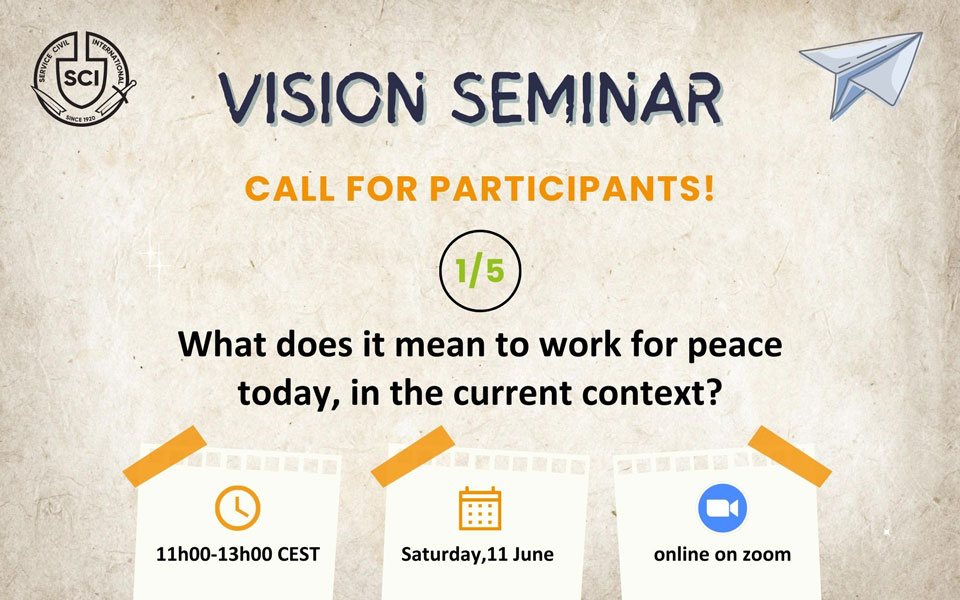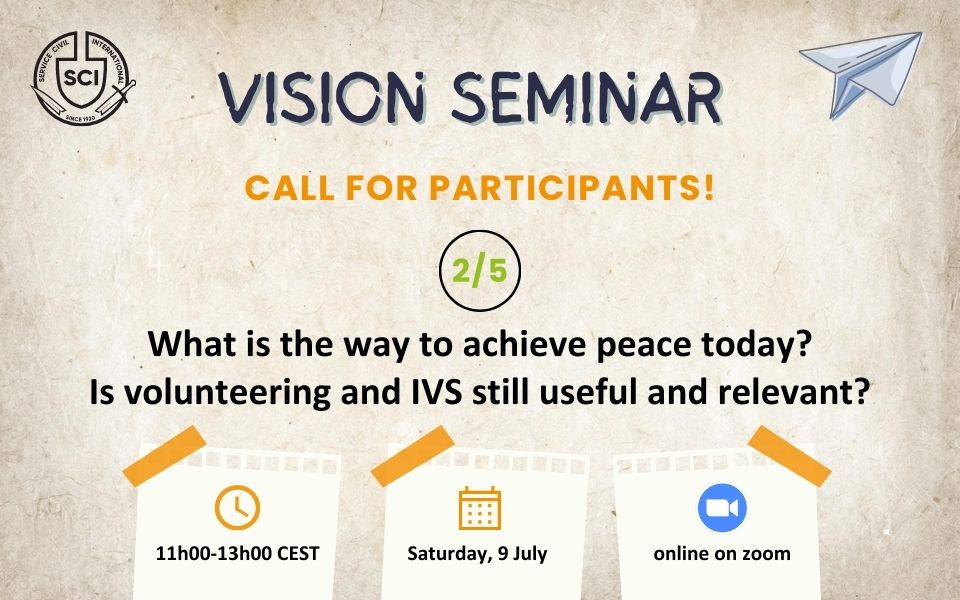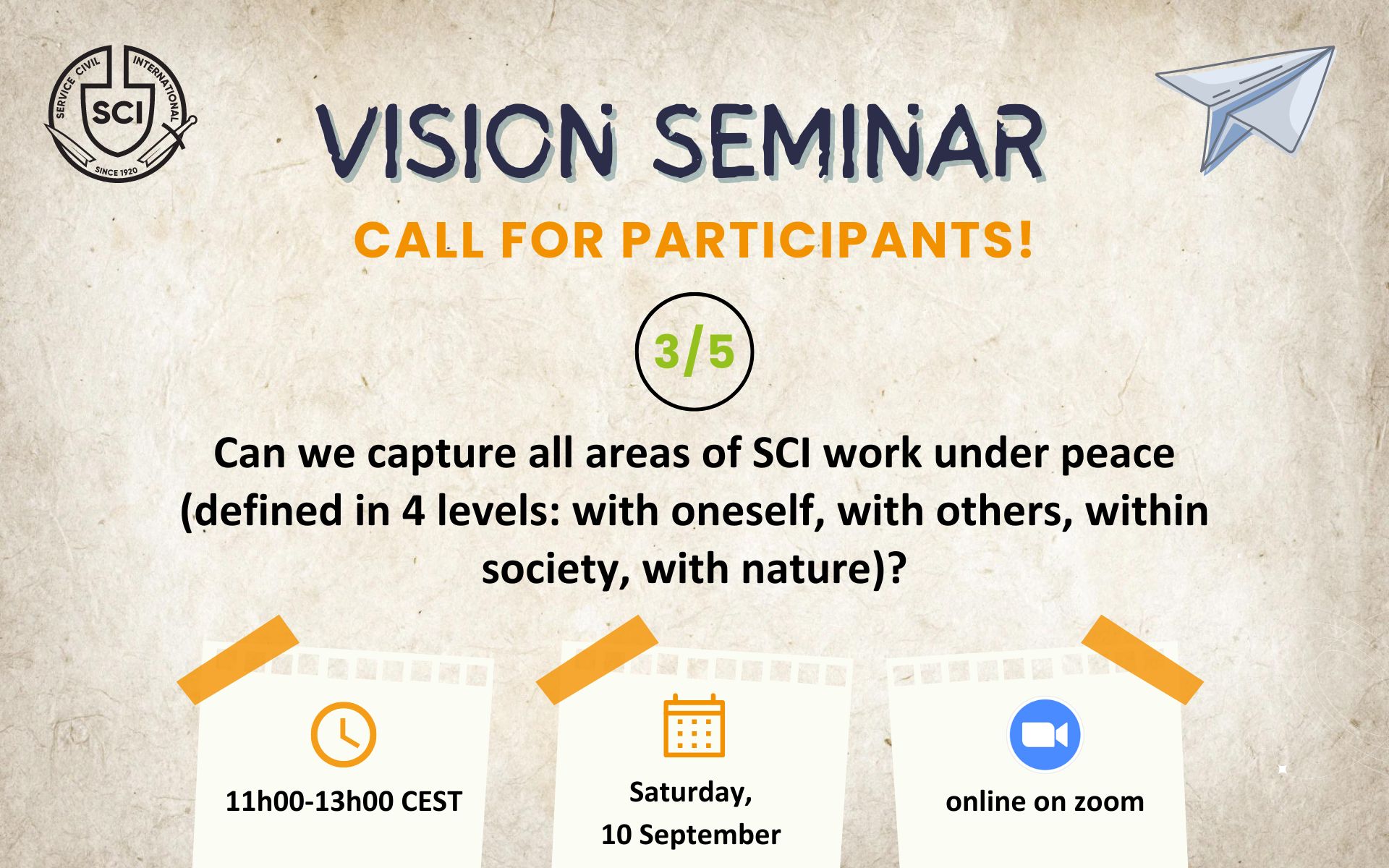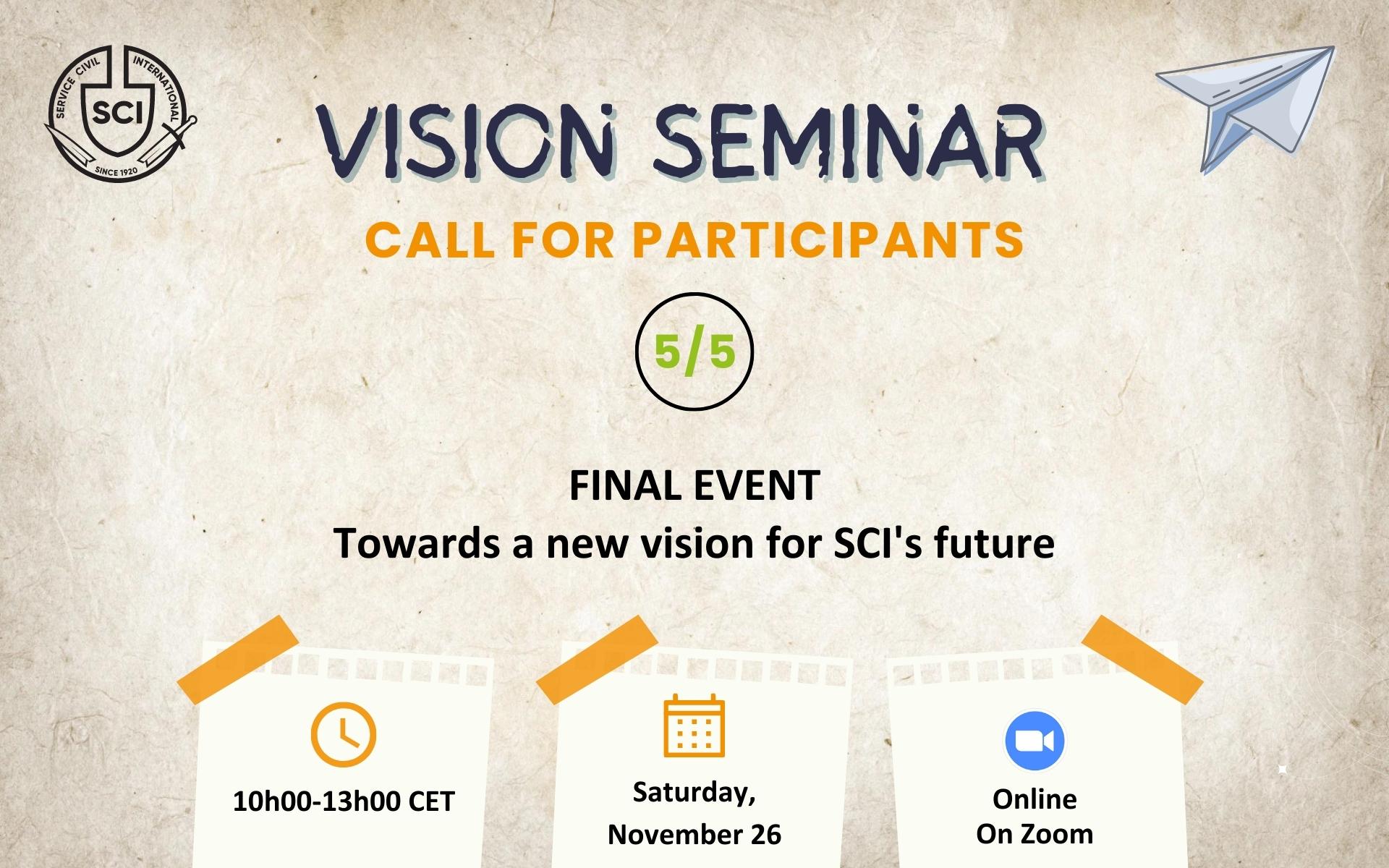VISION SEMINAR
(A series of 5 workshops)
Where do we come from?
Where do we go?
The Idea
The Vision Seminar, which was intended to take place in 2020 in the framework SCI’s 100-year anniversary celebrations, finally took place in 2022 (2022 is 2020 too?). It consisted of four zoom sessions and a final event online. We intended to make a link between the 2020 process and the new SCI Strategic Plan, and, somehow, to symbolically create a bridge between the past and the future.
The process was meant to grow from the seed of SCI history and not to start from scratch. However, if the memory and the experience of the history are of a great value, the understanding of the new times, the new – feminist, gender, ecological, antimilitaristic, etc… – approaches and the youth potential, ideas, virtues, know-how are important and appreciated as well. The synergy between the old and the new and between the logical framework approach and the disruptive output are paving the path to innovation, coherence and consistency, as expected. At the end of the day, we wanted to build the Strategic Plan for the SCI of the next 4 years.
Who could participate?
The Vision Seminar process was open to everybody, to the oldest and youngest SCI activists, from East to West and from South to North, with some or a lot of experience, AND with a clear will to be part of the SCI new Vision of Peace and of SCI future! We were looking for enthusiastic participants who were interested in contributing to the discussion.
Background
The 2020 process was meant to be a journey “from the Memory of SCI Peace work to a new Vision of Peace in the new times” (2020.sci.ngo). Thus, the anniversary was a good opportunity to acknowledge the work of SCI as a movement for peace, both throughout SCI history and within the history of pacifism. The vision seminar was to be the final moment of the 2020 process where we would bring light on the present times and push for the construction of a new vision of peace to guide SCI action in the future. However, the pandemic arrived and the seminar couldn’t take place, while the question became even more acute – the Vision Seminar became more relevant than ever! -.
Do SCI projects still provide appropriate answers, as Cérésole’s proposal did in front of the harsh reality of the post-World War one? His first vision of the international voluntary service (IVS), with the collateral proposals of conscientious objection, volunteers’ exchanges, reconciliation work, was innovative and inspiring, by putting the people in the middle of the proposal. Now, the new technology – with robotics, artificial intelligence, virtual reality and post-truth, accelerated by the pandemic – has “peripheralized” the paradigms of “human being”, human relations”, “humanity”, and “exchange” which are in the very essence of SCI definition of peace. Which implications can such a semantic turning point have for our work?
Furthermore, new geopolitical developments happen very quickly, with a new arms escalation and new geopolitical alliances, while the majority of humans are kept at the margins. A new era, the New-Now – or tell it as you want – had started.
The Verdun first workcamp and SCI history have inspired us all the way until today! Now, in quickly changing and unpredictable times, where new technological and geopolitical developments happen and new paradigms appear every day, we definitely needed to reflect together on the role of SCI, as well as on the values, methods, meaning and impact of the workcamps and IVS in general, with respect to nowadays new – and old – peace issues. It was time to be VISIONARIES again! And dare to come back to the roots, to the very nuclear question: “What is the meaning of International Voluntary Service (IVS) as a tool for Peace? How is it relevant, effective and impacting in our globalised world?” As daringly stated in the “Introduction” of SCI 2020-2023 strategic plan, we asked “whether we are working in the most relevant way to address the 21st century challenges to peace”. Our world is indeed so different now, after the pandemic! It was time for a new vision to inspire us towards tomorrow.
The Vision Seminar was meant to enable such a reflection, to challenge together our present and future.
Online events
The vision seminar consisted of four virtual – zoom – meetings about four main issues and a final seminar to draw the due conclusions and start working out the New Strategic Plan for the next few years.
Each seminar, after an introduction of the agenda, had one or more experts introducing the topic, adding valuable information and contributing some ideas for discussion. Afterwards, participants were discussing different questions in small groups and presenting the main ideas in the plenary.

1/5 What does it mean to work for peace today, in the current context?
? Saturday, June 11 – 11h00-13h00 CEST
The first event was organised by Gianni Orsini, with the support of Erilda Kola and the expert intervention of Mrs. Simona Costanzo Sow. 16 participants were present at the zoom event.
After an introduction of the Vision Seminar process, background and objectives, Gianni introduced the context by talking about “The spirit of Ceresole in our new times, comparing 1920 and 2020”, followed by the intervention of the guest speaker Mrs. Simona Costanzo Sow, United Nations System Staff College (UNSSC), on “The New Now, the new paradigms, the new challenges for peace”. Participants debated in working groups about the question of “Changing the vision!?” and shared the results in the plenary.

2/5 What is the way to achieve peace today?
The second event was organised by Wilber Helsloot, with the expert intervention of Goran Božičević and Björn Kunter. 14 participants were present at the zoom event.
The two guest speakers – Goran Božičević, peace trainer and activist, associated SCI-friend and Björn Kunter, former SCI-activist who has been active in several peace-organisations, shared their experiences as peace activists and gave some inputs for the following groups discussions. Participants were divided in smaller groups to discuss the following questions and later shared their main points in the plenary:
- Is International Voluntary Service (IVS) (still) the right and relevant way?
- Should peace-building have a more profound element in our IVS?
- Should SCI do more than IVS? Why or why not, if yes, what and how?

3/5 Can we capture all areas of SCI work under peace (defined in 4 levels: with oneself, with others, within society, with nature)?
The third event was organised by Silvio Martinelli, with the expert intervention of Jamison Ervin. 16 participants were present at the zoom event.
The guest for the event was Ervin Jamison, Ph.D., Manager of the Global Programme on Nature for Development (Nature, Climate and Energy; Bureau for Policy and Programme Support) at the United Nations Development Programme. She focussed more on the aspect of Peace with Nature, given the growing interest in this area and the importance for SCI to find its space.

4/5 SCI: one international peace movement or a network of individual organisations?
The fourth event was organised by Bert Verstappen, who also shared his learnings while working 30+ years for an international human rights NGO. The participants discussed the role of civil society, the advantages of networking, the present and potential partners of SCI and the characteristics of SCI as an organisation, network and movement.
15 participants were present at the zoom event.
5) VISION SEMINAR: Towards a new vision of SCI's future
The final event, that took place online on 26 November 2022, concluded the series of workshops by taking on board the conclusions, recommendations and proposals of the four previous workshops and drawing some lessons learnt and vision for the future of SCI.


